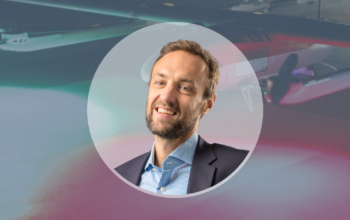
Unboxing: Europe’s extraordinary world of cargo
Cargo: a side of aviation most passengers – and many airports – never see. Yet, cargo operations are a vital part of many regional economies – delivering essential goods, connecting industries, and ultimately keeping the world moving.
In this month’s Five Minute Feature, dive deep into the underbelly of the cargo world with a pan-European interview. Through the cargo experts of Amsterdam Schiphol Airport (AMS), East Midlands Airport (EMA), Nuremberg Airport (NUE) and Dubrovnik Airport (DBV), each will reveal a different – yet essential – perspective of the cargo ecosystem, proving this side of aviation is anything but ordinary.
Cargo operations differ greatly from the passenger journey; having its own distinct character – with each airport having a unique cargo scenario. For our four airports, what makes their situations unique? For Nuremberg, Dr Michael Hupe (Managing Director) notes their strong geographical context – and potential to expand. ‘The Nuremberg metropolitan region is a strong economic area – our cargo business is currently focused on road feeder services, which involves transporting air cargo by truck to major cargo hubs such as Frankfurt or Leipzig, as well as belly cargo, e.g. on Turkish Airlines flights,’ he explains. ‘We would very much like to develop a scheduled air freight service. To achieve this, however, we require partners willing to make an initial economic investment.’ At Dubrovnik, the scenario is entirely different: CEO Viktor Šober elaborates. ‘Our cargo story is unique because we operate in an environment without major industry or large manufacturers to rely on. For this reason, we developed a different approach: focusing on flexibility, quick adaptation to market changes, and niche needs such as urgent shipments and supplies for the tourism sector.’
For East Midlands and Amsterdam Schiphol, a focus on cargo has shaped their entire development and operations. David Craig, Head of Aviation at East Midlands Airport, notes their 24/7 operations and unique runway configuration as key factors: ‘The way our apron is designed means that cargo and passenger traffic never interact, so there is no need to prioritise one over the other.’ At Amsterdam Schiphol Airport, Eduard Molkenboer (Head of Cargo) and Luc Scheidel (Manager Airport & Customs Process Cargo) highlight the guiding power of their strategic plans. ‘Our strategy has four pillars: to maximise the use of existing capacity, to be the first choice for cargo and freight for suppliers, to keep investing in modernisation, and to focus on sustainability,’ Eduard explains. ‘We have a great competitive advantage through a good relationship with our partners: customs, freight handlers, trucking companies – they are the oxygen in our system.’
Every cargo-focused airport has its particular strengths – specific features of its operations that allow it to get ahead of the competition. For Amsterdam Schiphol, Eduard highlights their USP: ‘We serve 299 connections, 123 of them intercontinental and 176 within the EU. We really stick out for that – as well as in our excellent hinterland connections, where we leverage on the proximity of port connections.’ Luc continues: ‘That dense network, it shows trust in our operations – the left hand really supports the right hand. Cargo is a powerful catalyst for growing our connections for all traffic.’ For Nuremberg, a unique operational context provides strength, Michael explains – ‘our airport provides 24/7 operations, as well as 24/7 customs services. This is a USP in southern Germany, alongside our modern infrastructure.’ At Dubrovnik, a higher ratio of passengers is seen as an asset: ‘although cargo is not our primary focus, this position encourages us to be innovative and adaptable. Our smaller operational scale allows for faster shipment processing, shorter dwell times, and a more personal approach to clients.’
While cargo boxes tend not to complain, it isn’t necessarily true that cargo operations are ‘easier’ than handling passengers. How are these airports rising to the challenges they face? At Dubrovnik, storage capacities such as cooling units and specialised warehouses are limited: ‘investments must be carefully planned to remain commercially sustainable. While expansion is possible, we approach it responsibly, accepting only as many specialised shipments as we can process reliably and to the highest quality standards.’ At Amsterdam Schiphol, time-critical, perishable, fragile and (often) valuable products require specific care – ‘perishables are very important for us: flowers, but also fish,’ Luc explains. ‘We ensure proper handling by investing in our processes, such as the Smart Cargo Mainport Programme, which optimises processes with partners. We also invest in the infrastructure: a new building to support pharmaceutical cargo; and dnata’s new cargo facility, as examples.’
While infrastructure and process help immensely, the people behind cargo make or break the system. Cargo operations can be demanding – often involving night work and tight deadlines. How do these airports protect staff wellbeing? At East Midlands, David emphasises their strong community connection. ‘We have an incredible community: we’re known as a big employer in the area, and so people really ‘gel’ with our operations. Fortunately, with the popularity of our cargo operations, we’re non-stop all the time – which adds regularity and reliability to our work, which in turn contributes to staff wellbeing. Cargo is front and centre for us, and so are our people.’ Amsterdam Schiphol shares a similar story: ‘The Netherlands is built on collaboration, and it is the same at Schiphol. We even have a Dutch word for it – polderen: collaboration is in our DNA.’ Nuremberg also focuses on teamwork: ‘we have brought our experience to a new company to develop dedicated colleagues who can reliably work together, even under time pressure,’ Michael notes. At Dubrovnik, a small and close team keep wellbeing at the forefront: ‘We maintain a strong team spirit through regular communication and recognition of effort. Caring for staff wellbeing directly strengthens motivation and engagement, which translates into reliable and efficient service for our customers.’
Yet as the world evolves and geopolitics continue to affect aviation significantly, all airports must adapt and innovate. What do these airports have planned for the future? At Dubrovnik, the mission is clear: ‘digitalisation of cargo processes and closer integration with customs are among our top priorities – continuous innovation is essential to competitiveness. We are considering expanding capacities for specialised and seasonal shipments to meet the growing needs of our region and market,’ Viktor notes. At Nuremberg, new infrastructure awaits: ‘to meet the continuing high demand, we are building the new Cargo Centre Nuremberg 3 (CCN3) with around 4,600 m² of warehouse space and 1,600 m² of office space. This will not only create additional capacity but also provide the necessary flexibility to respond to global changes in trade – and ensure the competitiveness of the location.’
At East Midlands, to meet a predicted 54% growth in demand, plans include 122,000 m2 of warehouse space and 274,000 m2 of additional space – potentially supporting more than 20,000 jobs. ‘We’re open to listening to how the market develops,’ David states. ‘Our development will be done in a way that matches the market: there are many possibilities.’ At Amsterdam Schiphol, the focus is digital: ‘since the 1980s, we’ve used a digital platform – Cargonaut – that has recently been renewed. We’re also focusing our innovations on sustainability: our goal for 2030 is to be emission-free on the ground, and we’re working on making all our ground vehicles electric,’ states Eduard.
Cargo can sometimes get a little wild – odd and unusual shipments always stand out. Dubrovnik is prepared to adapt: ‘each shipment has its own story. We’ve handled everything from aircraft carrying film crew equipment and concert gear for world-famous artists, to complex deliveries of fresh fish from Australia – even bonsai trees.’ Formula 1 fans may want to head to East Midlands: ‘We handle the bespoke and specialist shipments of Formula 1 racing cars, safety cars, and team equipment. These also require specialist aircraft, which gather a lot of attention. Not every airport can handle this, yet the Formula 1 teams require assurance that we’ll work perfectly. We’re proud of Formula 1 trusting our reliable and robust processes.’
Nuremberg’s most special cargo related to humanitarian efforts in response to the devastating earthquake in Turkey in 2023: ‘within a few days, around 15 tonnes of relief supplies, including over 120 power generators, medical equipment and tents, were handled via Nuremberg Airport,’ Michael notes. ‘We actively supported the preparation and loading as an airport, coordinating the process with Turkish Airlines, freight forwarders and the relevant authorities. These extraordinary operations demonstrate the flexibility and commitment of our team when it matters most.’ Eduard focuses on a fluffier package at Amsterdam Schiphol: ‘We transported the two pandas, Wu Wen and Xing Ya, from Chengdu. We were very proud – the entire community was. If you visit the KLM warehouse, you can still see a photo of the two pandas on the walls!’
With all this work considered, what do these airports consider their standout achievement of the last 12 months? At Nuremberg, the ‘in-house approval, submission and signing of the contract for our third Cargo Centre’ marks their proudest moment. For both East Midlands and Dubrovnik, the expansion of carriers has been a mark of success – for Dubrovnik, an increase in United Airlines flights and the reestablishment of direct cargo connections with the United States. For David and East Midlands, they count One Air (the only UK-registered cargo airline) establishing their sole base at East Midlands as their proudest moment. For Amsterdam Schiphol, Eduard, and Luc focus on community. ‘We have a motto here: on your own, you will go faster, but together, you will go further,’ remarks Luc. ‘We’re side by side, looking together, and that is really our main achievement,’ adds Eduard.
For airports looking to expand their cargo processes, what recommendations do these airports offer? ‘Develop a healthy community!’ Eduard notes. For Michael, knowledge is key: ‘anyone looking to grow their freight business needs two things above all else: an understanding of the industry of the region and its demand for air transport.’
Viktor focuses on skill: ‘nothing can be achieved without a capable and motivated team to put plans into action. Alongside a clear vision, people are the foundation of success – professionals who know, want, and can do the job with commitment and dedication.’ For David, adaptability is key: ‘the carriers that can adapt the fastest to market changes are the ones that succeed the most. That’s what we see is working best. Just be adaptable to a constantly changing market.’









